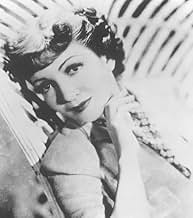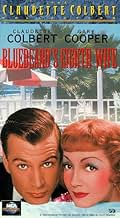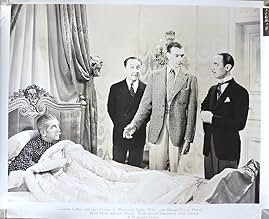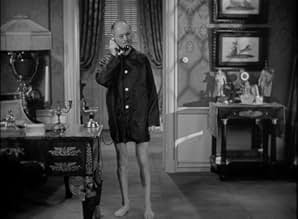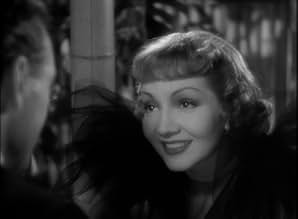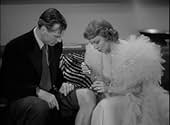PUNTUACIÓN EN IMDb
7,1/10
5 mil
TU PUNTUACIÓN
Después de enterarse de que su prometido multimillonario ya se ha casado siete veces, la hija de un marqués sin dinero decide domarlo.Después de enterarse de que su prometido multimillonario ya se ha casado siete veces, la hija de un marqués sin dinero decide domarlo.Después de enterarse de que su prometido multimillonario ya se ha casado siete veces, la hija de un marqués sin dinero decide domarlo.
- Dirección
- Guión
- Reparto principal
- Premios
- 2 premios en total
Mariska Aldrich
- Nurse at Door
- (sin acreditar)
Leon Ames
- Ex-Chauffeur
- (sin acreditar)
Lenore Aubert
- Party Guest
- (sin acreditar)
Eugene Borden
- Waiter on the Stairs
- (sin acreditar)
Barlowe Borland
- Uncle Fernandel
- (sin acreditar)
Reseñas destacadas
Years before pre-nuptial agreements became a regular thing, Ernest Lubitsch made a screen comedy on which they are the basis. Bluebeard's Eighth Wife involves Gary Cooper as a multi-millionaire living on the French Riviera who's been married seven times and now marries Claudette Colbert for number eight. But Cooper's a good sport about it, he always settles with his ex-wives for a $50,000.00 a year as per an agreement they sign before marrying him. Sounds like what we now call a pre-nuptial agreement.
Of course Claudette wants a lot more than that and she feels Cooper takes an entirely too business like approach to marriage. She'd like the real deal and is willing to go some considerable lengths to get it.
Bluebeard's Eighth Wife has some really funny moments, the original meeting of Cooper and Colbert in a men's store where Cooper is insisting he wants only pajama tops and Colbert looking for only bottoms. And of course my favorite is Colbert trailing and blackmailing the detective Cooper sends to spy on her. Herman Bing has the best supporting role in the film as that selfsame, flustered detective.
I've often wondered how back in the day Hollywood could get away with casting so many people who are non-French in a film like this. Of course Cooper is an American and Colbert of the cast is the only one actually of French background. Though David Niven is charming as always, having him be a Frenchman is ludicrous, he is sooooooo British.
Nevertheless Bluebeard's Eighth Wife is an enjoyable film and a great example of what was called 'the Lubitsch touch' back in the day.
Of course Claudette wants a lot more than that and she feels Cooper takes an entirely too business like approach to marriage. She'd like the real deal and is willing to go some considerable lengths to get it.
Bluebeard's Eighth Wife has some really funny moments, the original meeting of Cooper and Colbert in a men's store where Cooper is insisting he wants only pajama tops and Colbert looking for only bottoms. And of course my favorite is Colbert trailing and blackmailing the detective Cooper sends to spy on her. Herman Bing has the best supporting role in the film as that selfsame, flustered detective.
I've often wondered how back in the day Hollywood could get away with casting so many people who are non-French in a film like this. Of course Cooper is an American and Colbert of the cast is the only one actually of French background. Though David Niven is charming as always, having him be a Frenchman is ludicrous, he is sooooooo British.
Nevertheless Bluebeard's Eighth Wife is an enjoyable film and a great example of what was called 'the Lubitsch touch' back in the day.
Oh Lubitsch how we needed you. Others could elicit fiery performances from actors, captivate with riveting story or lavish us with sets and camera magic. These usually require to be propped up with some effort, but what Lubitsch does simply requires letting go of, in particular letting go of our need to prop up fiction a certain way.
Usually understood as a gift for wit, his famed 'Lubitsch touch' is actually a mastery of something else, spontaneous illogicality. I have written about him in a few other posts so will not bore you here. It's the continuous shift of context, the dismantling of our expectation that story plays out a certain way.
The story could be anything, here a man and woman court each other while vacationing in the French Riviera. He's the blustering American type who won't take no and won't tiptoe around European niceties. She's elegant and smart but will not stoop to be wowed by money like her shyster father.
In the usual mode, they would brush and bounce off each other whilst trying to top each other for control over the story. This as hardwon love that surprises. That's fine, plenty of enjoyable films were being made in this time, what we now know as screwball. For me it's all a matter of how we brush, how much narrative space the players create by pushing and pulling, in which self can take shape, actual visible shape, as the story we watch. Capra has a very agile touch in It Happened One Night. I happen to find His Girl Friday coarse, par the course for Hawks.
In Lubitsch's world, we shift and shift again in a jazz merry-go-round of elusive self. Here's some of it. They meet as strangers in a store, cooperating over trying to buy pyjamas. He decides he's smitten, but uses money to come close to her. So what happens? She agrees to be bought as a wife but gives him a thankless marriage for it, although in love herself.
This is lovely work, clean, vibrant. Some if are just gags, like having married seven times before her. But quite a bit of it is that wondrous surprise where emotions express themselves in paradoxical ways.
Usually understood as a gift for wit, his famed 'Lubitsch touch' is actually a mastery of something else, spontaneous illogicality. I have written about him in a few other posts so will not bore you here. It's the continuous shift of context, the dismantling of our expectation that story plays out a certain way.
The story could be anything, here a man and woman court each other while vacationing in the French Riviera. He's the blustering American type who won't take no and won't tiptoe around European niceties. She's elegant and smart but will not stoop to be wowed by money like her shyster father.
In the usual mode, they would brush and bounce off each other whilst trying to top each other for control over the story. This as hardwon love that surprises. That's fine, plenty of enjoyable films were being made in this time, what we now know as screwball. For me it's all a matter of how we brush, how much narrative space the players create by pushing and pulling, in which self can take shape, actual visible shape, as the story we watch. Capra has a very agile touch in It Happened One Night. I happen to find His Girl Friday coarse, par the course for Hawks.
In Lubitsch's world, we shift and shift again in a jazz merry-go-round of elusive self. Here's some of it. They meet as strangers in a store, cooperating over trying to buy pyjamas. He decides he's smitten, but uses money to come close to her. So what happens? She agrees to be bought as a wife but gives him a thankless marriage for it, although in love herself.
This is lovely work, clean, vibrant. Some if are just gags, like having married seven times before her. But quite a bit of it is that wondrous surprise where emotions express themselves in paradoxical ways.
It starts in the French Riviera at a dressing department store where an elegant man wants to buy pyjama tops and a woman the bottoms . He is the US multi-millionaire Michael Brandon (Gary Cooper, though miscast , at times ) who tries to marry his eight wife , called Nicole (Claudette Colbert is fine as the beautiful girl who aims to be his eighth) . After learning her multi-millionaire fiancé has already been married seven times , Nicole , daughter of a bankrupted French Marquis (Edward Everett Horton) attempts to tame the egoistic man and he then ends at an asylum . He married in haste and repeated in pleasure!
Problematic comedy and sporadically fun , set in the French Riviera about a spoiled millionaire who attempts to marry the daughter of a penniless marquis , she then decides to control him , as she doesn't want to be only a number in the row of his ex-wives and starts her own strategy to "tame" him . Good for a few laughs , based on the play by Alfred Savoir and American version by Charlton Andrews with a diverting script by prestigious Charles Brackett and Billy Wilder , though providing a wrong sort of discomfort to the closing scenes at a lunatic sanatorium . Adding some scenes justifying Ernst Lubitsch's reputation for his famous ¨Touch¨ , along with adequate as well as evocative musical score by Frederick Hollander . This Lubitsch romp contains a very good main and support cast . Gary Cooper is nice as the millionaire who who can handle money but not wives , as he has a comeuppance coming up from the eighth , though Coop seems out of place as a playboy . Claudette Colbert is perfect as the woman who aims to be his eighth and she then tries to tame him. There's astringent and typecast secondary cast from sympathetic Edward Everett Horton as the broken Marquis De Loiselle , delightful David Niven as Albert De Regnier , Elizabeth Patterson as Aunt Hedwige , Herman Bing as Monsieur Pepinard , Warren Hymer as Kid Mulligan and Franklin Pangborn as snooty Assistant Hotel Manager
The motion picture well photographed by Leo Tover was competently made by master filmmaker Ernst Lubitsch ,though softening the script's acidity, and he had previously directed Gary Cooper in Design for life . Lubitsch was a maestro director of naughty but entertaining comedies who had lots of successes . Lubitsch's breakthrough film came in 1918 with "The Eyes of the Mummy", a tragedy starring future Hollywood star Pola Negri. Also that year he made Carmen (1918), again with Negri, a film that was commercially successful on the international level. His work already showed his genius for catching the eye as well as the ear in not only comedy but historical drama. The year 1919 found Lubitsch directing seven films, the two standouts being his lavish Madame DuBarry (1919) with two of his favorite actors--Negri (yet again) and Emil Jannings. His other standout was the witty parody of the American upper crust, "The Oyster Princess" 1919 . This film was a perfect example of what became known as the Lubitsch styl e, or the "Lubitsch Touch", as it became known--sophisticated humor combined with inspired staging that economically presented a visual synopsis of storyline, scenes and characters. Lubitsch directed a lot of comedies and vintage movies , such as : ¨Heaven can wait¨, ¨That uncertain feeling¨, ¨Ninotchka¨, ¨Bluebeard's eight wife¨, ¨Angel¨, ¨The merry widow¨, ¨The Student Prince¨, ¨So this is Paris¨, ¨Lady Windermere's fan¨, ¨The marriage circle¨, ¨One Arabian night¨, ¨Passion¨, ¨Gypsy blood¨, among others . Rating : 7/10 . Better than average .
Problematic comedy and sporadically fun , set in the French Riviera about a spoiled millionaire who attempts to marry the daughter of a penniless marquis , she then decides to control him , as she doesn't want to be only a number in the row of his ex-wives and starts her own strategy to "tame" him . Good for a few laughs , based on the play by Alfred Savoir and American version by Charlton Andrews with a diverting script by prestigious Charles Brackett and Billy Wilder , though providing a wrong sort of discomfort to the closing scenes at a lunatic sanatorium . Adding some scenes justifying Ernst Lubitsch's reputation for his famous ¨Touch¨ , along with adequate as well as evocative musical score by Frederick Hollander . This Lubitsch romp contains a very good main and support cast . Gary Cooper is nice as the millionaire who who can handle money but not wives , as he has a comeuppance coming up from the eighth , though Coop seems out of place as a playboy . Claudette Colbert is perfect as the woman who aims to be his eighth and she then tries to tame him. There's astringent and typecast secondary cast from sympathetic Edward Everett Horton as the broken Marquis De Loiselle , delightful David Niven as Albert De Regnier , Elizabeth Patterson as Aunt Hedwige , Herman Bing as Monsieur Pepinard , Warren Hymer as Kid Mulligan and Franklin Pangborn as snooty Assistant Hotel Manager
The motion picture well photographed by Leo Tover was competently made by master filmmaker Ernst Lubitsch ,though softening the script's acidity, and he had previously directed Gary Cooper in Design for life . Lubitsch was a maestro director of naughty but entertaining comedies who had lots of successes . Lubitsch's breakthrough film came in 1918 with "The Eyes of the Mummy", a tragedy starring future Hollywood star Pola Negri. Also that year he made Carmen (1918), again with Negri, a film that was commercially successful on the international level. His work already showed his genius for catching the eye as well as the ear in not only comedy but historical drama. The year 1919 found Lubitsch directing seven films, the two standouts being his lavish Madame DuBarry (1919) with two of his favorite actors--Negri (yet again) and Emil Jannings. His other standout was the witty parody of the American upper crust, "The Oyster Princess" 1919 . This film was a perfect example of what became known as the Lubitsch styl e, or the "Lubitsch Touch", as it became known--sophisticated humor combined with inspired staging that economically presented a visual synopsis of storyline, scenes and characters. Lubitsch directed a lot of comedies and vintage movies , such as : ¨Heaven can wait¨, ¨That uncertain feeling¨, ¨Ninotchka¨, ¨Bluebeard's eight wife¨, ¨Angel¨, ¨The merry widow¨, ¨The Student Prince¨, ¨So this is Paris¨, ¨Lady Windermere's fan¨, ¨The marriage circle¨, ¨One Arabian night¨, ¨Passion¨, ¨Gypsy blood¨, among others . Rating : 7/10 . Better than average .
When my colleague suggested watching this movie, she showed me the Shakespeare-reading scene. As I found it really amusing, I later watched the whole piece. And I didn't regret the time I spent! To say honestly, I'm not the old movie addict who knows all the history of American and European film industry back to black-and-white silent pictures and being woken up at night can list all the prominent actors and directors. I'm not into movies at all, which is the reason that my watching list is highly haphazard with British series followed up by French melodramas and historical documentaries. Bluebeard's Eighth Wife is a really nice piece featuring good-looking actors, jokes, funny without the slightest trace of vulgarity. The plot is a turned inside out ''Taming of the Shrew'', and no wonder it appears as a book the main hero reads, as I mentioned at the beginning of my review. However, it is common knowledge that not the plot itself, but its presentation matters, and in this case it does not undermine expectations. The naivety of the old times has a special charm, especially the good old happy end, so enjoy!
An Ernst Lubitsch comedy, co-scripted by Billy Wilder and Charles Brackett, which has always been generally dismissed by critics and fans alike. Perhaps with the film's reputation as a lesser effort those who sit down to view it will be pleasantly surprised to find it an agreeable affair, anyway.
Gary Cooper plays a seven times married American businessman millionaire who finds that with wife no. 8 (Claudette Colbert) he may have met his match. She has made him agree to a pre nuptial agreement of paying her $100,000 should there be a divorce and then makes him spend much of the marriage unhappy and wishing he hadn't signed that agreement.
While the film is never as funny or clever as the best of Lubitsch, it still has its moments. The film is remembered primarily for the scene in which Colbert and Cooper "meet cute" as they agree to split a pair of pajamas in a department store.
But there are other moments, too, such as the scene in which Cooper, inspired by having just read Taming of the Shrew, bursts out of his room, walks with great macho determination and accompanying soundtrack drum roll down a hallway, enters a room where Colbert stands and slaps her across the face. She responds by slapping him back and Cooper, perplexed by this unexpected turn of events, leaves the room, walks back through that same hallway to his room again and picks up the book to try to figure out what he did wrong.
Like all Lubitsch productions this film has a graceful air of sophistication, with a physical elegance in its sets and photography. Colbert is an old hand at frothy material like this while Cooper, cast against type, plays his role with obvious enthusiasm. He's a far cry from the Cooper we're used to seeing on screen in the scene in which he plays a piano while singing "Looky, looky, looky, Here comes Cookie" to Claudette. The supporting cast is first rate, all of them deft performers: a young David Niven, and old pro character actors Edward Everett Horton and Herman Bing.
English mangling, beer barrel shaped Herman Bing is the unlikeliest of detectives, hired by Cooper to follow his wife to see if she has any lovers. "Don't forget," he tells the millionaire, "we are a first class firm. You will find that out when you get our bill." Recommended as middling production code era Paramount fare.
Gary Cooper plays a seven times married American businessman millionaire who finds that with wife no. 8 (Claudette Colbert) he may have met his match. She has made him agree to a pre nuptial agreement of paying her $100,000 should there be a divorce and then makes him spend much of the marriage unhappy and wishing he hadn't signed that agreement.
While the film is never as funny or clever as the best of Lubitsch, it still has its moments. The film is remembered primarily for the scene in which Colbert and Cooper "meet cute" as they agree to split a pair of pajamas in a department store.
But there are other moments, too, such as the scene in which Cooper, inspired by having just read Taming of the Shrew, bursts out of his room, walks with great macho determination and accompanying soundtrack drum roll down a hallway, enters a room where Colbert stands and slaps her across the face. She responds by slapping him back and Cooper, perplexed by this unexpected turn of events, leaves the room, walks back through that same hallway to his room again and picks up the book to try to figure out what he did wrong.
Like all Lubitsch productions this film has a graceful air of sophistication, with a physical elegance in its sets and photography. Colbert is an old hand at frothy material like this while Cooper, cast against type, plays his role with obvious enthusiasm. He's a far cry from the Cooper we're used to seeing on screen in the scene in which he plays a piano while singing "Looky, looky, looky, Here comes Cookie" to Claudette. The supporting cast is first rate, all of them deft performers: a young David Niven, and old pro character actors Edward Everett Horton and Herman Bing.
English mangling, beer barrel shaped Herman Bing is the unlikeliest of detectives, hired by Cooper to follow his wife to see if she has any lovers. "Don't forget," he tells the millionaire, "we are a first class firm. You will find that out when you get our bill." Recommended as middling production code era Paramount fare.
¿Sabías que...?
- CuriosidadesThis was the first collaboration of director Ernst Lubitsch with writers Charles Brackett and Billy Wilder. At their first production meeting, Lubitsch posed this question: "How do the boy and girl get together?". Wilder promptly suggested that the opening scene should be in the men's shop of a department store. "The boy is trying to buy a pajama," he extemporized, "but he sleeps only in the tops. He is thrifty so he insists on buying ONLY the tops. The clerk says he must buy the pants, too. It looks like a catastrophe. Then the girl comes into the shop and buys the pants because she sleeps only in the pants." Lubitsch and Brackett were enchanted with this idea. Months later, they discovered that Wilder himself was a pajama tops-only sleeper and had been contemplating this idea for months, waiting for a chance to use it in a comedy.
- PifiasWhen Nicole shuts the door to her part of the apartment to keep Michael out, the door can be heard being locked. However, there is no keyhole or lock visible on either side of the door.
- Citas
Nicole de Loiselle: [sarcastically] Mr. Brandon, you're terrific. You're gigantic! You're - you're breathtaking. I wish someone would tell you what I really think of you.
- ConexionesFeatured in Mark Kermode's Secrets of Cinema: The Romcom (2018)
- Banda sonoraHere Comes Cookie
(1935) (uncredited)
Music and Lyrics by Mack Gordon
Performed by Gary Cooper (vocal and piano)
Selecciones populares
Inicia sesión para calificar y añadir a tu lista para recibir recomendaciones personalizadas
- How long is Bluebeard's Eighth Wife?Con tecnología de Alexa
Detalles
- Fecha de lanzamiento
- País de origen
- Idiomas
- Títulos en diferentes países
- Bluebeard's Eighth Wife
- Localizaciones del rodaje
- Empresa productora
- Ver más compañías en los créditos en IMDbPro
Taquilla
- Presupuesto
- 1.300.000 US$ (estimación)
- Duración1 hora 25 minutos
- Color
- Relación de aspecto
- 1.37 : 1
Contribuir a esta página
Sugerir un cambio o añadir el contenido que falta

Principal laguna de datos
By what name was La octava mujer de Barba Azul (1938) officially released in India in English?
Responde

